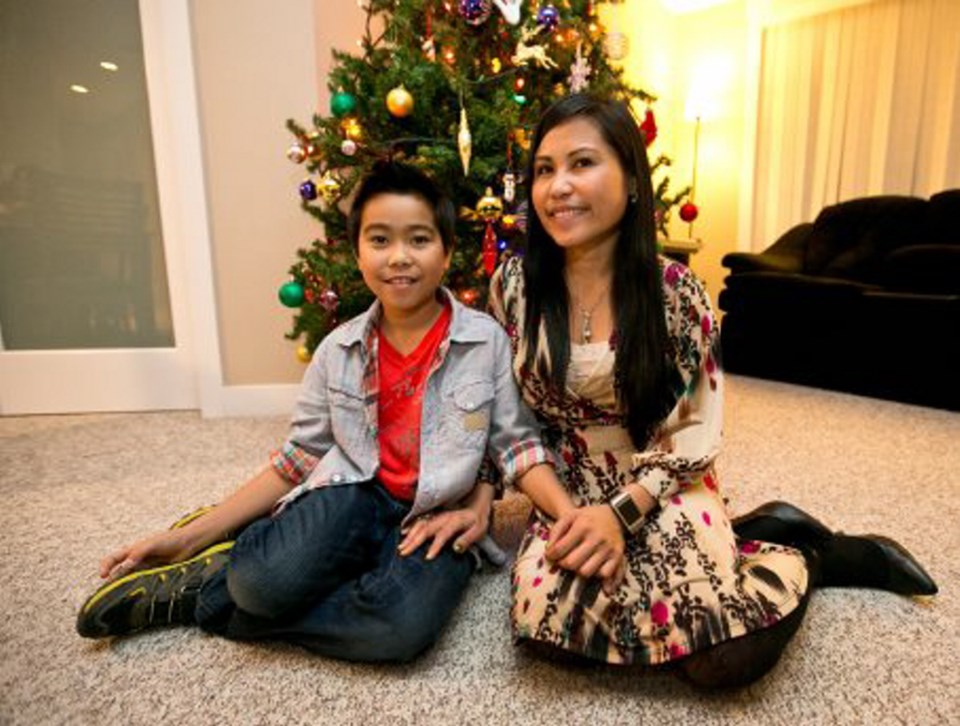At 22 years old, Sheila Montesclaros said goodbye to her infant son and family in the Philippines and went in search of work and a better life for all of them.
“It was really hard, but I had to,” Montesclaros said. “Life is too difficult there.”
She went to Hong Kong for two years and then came to Canada as a live-in caregiver for a Victoria family. She spent many holidays homesick and in tears, longing for her son, Carl.
Nearly nine years later, Montesclaros has been reunited with him. Carl arrived in Canada three months ago, under her sponsorship, and the two will spend their first Christmas together since the one they shared when Carl was a baby.
“He really wants to see snow,” said Montesclaros, who works as a scheduler for Beacon Community Services. Just to make sure, she booked a trip to Mount Washington with Carl, who’s now 10.
The holidays can be a difficult time for new immigrants — the unfamiliar traditions, the cold weather, the separation from family and the pressure to spend. But they also provide an opportunity for newcomers to learn about Canadian culture and build their own community, say settlement support workers.
“In our supported housing, most of the refugee and immigrant families are more interested in the cultural aspect of the holidays. They often like to feel a part of it,” said Shannon Whissell, from the Cridge Centre for the Family.
The organization houses immigrant families for up to three years, offering settlement programs. Each family receives a Christmas hamper and is invited to participate in events such as craft and baking workshops.
“We try to be sensitive and not proselytize but rather help people understand what’s happening this time of year,” Whissell said. “We talk about how in Canada, we don’t expect people to assimilate but they can share in traditions, accept and celebrate differences.”
Whissell said even those who come from countries that celebrate Christmas have a variety of rituals.
“Often, clients from South America or Mexico will celebrate on different days. For example, kids will get presents on the Epiphany from the three wise men, not Santa,” she said.
Multicultural events such as potlucks are a staple for settlement service providers, especially around the holidays when people from different faiths and backgrounds can share traditions with food as an icebreaker.
At the Intercultural Community Association potluck on Dec. 11, a gymnasium was filled with English-language students, teachers, family and friends chatting over dishes from countries around the world. The organization also hosts a winter talent show to raise funds for local charities, as well as programs that discuss the many faith and commercial traditions.
“We try to highlight the giving aspect,” said executive director Jean McRae. “And the food is from everywhere. It’s really fantastic.”
Natalia Potokina from Ukraine has been in Canada for five years. While she’ll have dinner with Canadian in-laws on Dec. 25, her Ukrainian family celebrates Christmas on Jan. 6 and 7.
“On the 6th, we put out no less than 12 special dishes — for the apostles,” she said. After that, everyone goes to the Ukrainian Orthodox Church for service. The food is left overnight, to honour those who have died, and presents are shared in the morning. “It’s a nice way to know our culture.”
Ana Von Schindler grew up in Communist Yugoslavia, where Christmas was celebrated covertly. When she went to France in the early 1980s, she had her first big holiday and learned a few of her cultural traditions, such as leaving oak branches and corn under the table for prosperity and making sweet cakes.
With her children’s spouses coming from a variety of heritages, they now celebrate “with a big international Christmas. It’s the best,” she said. Although she was raised in a Buddhist family in Seoul, South Korea, Jungsun Lee said her parents still left presents out at Christmas. Santa “magically” came until her sister spilled the beans when she was nine.
“But in Korea, Christmas is more for couples,” said the 29-year-old. When she arrived in Victoria three years ago, the holidays helped her connect with Canadians. Her first landlord invited her for Christmas dinner. “But I couldn’t speak English well. It was very awkward,” said Lee, who is studying English at Camosun College and wants to get into the film industry.
Overall, she said Victoria is a friendly place for new immigrants, though she hasn’t been able to find a Buddhist temple or much of a Korean Buddhist community. “One woman looked down on me, maybe because of my English or she thinks I’m young. But I understand her look. I think you get this in every country,” she said.
Each fall, teacher Henrietta Langran-DesBrisay organizes a potluck for all English-language students in Saanich School District 63 to meet each other and get to know some of the services in the area.
“The purpose is to make sure newcomers realize the breadth of services in the area and get to know other families,” she said. Anywhere from 200 to 500 newcomers and friends bring dishes from their home countries, such as Trinidadian curry chicken, Persian sweets and arroz con leche from Mexico.
The walls of the Royal Oak Middle School gymnasium are lined with photos and stories from schoolchildren in the district, telling their arrival stories and speaking about the people and traditions they left behind.



